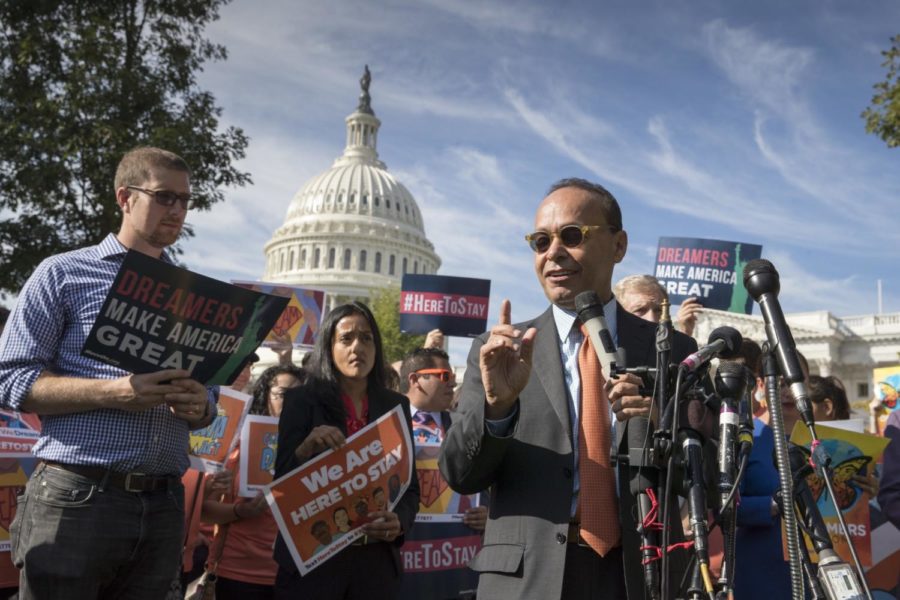DACA rescission could lead to deportations in Louisiana
Rep. Luis Gutierrez, D-Ill., a leading advocate in the House for comprehensive immigration reform, speaks in support of people affected by the Deferred Action for Childhood Arrivals program during a rally at the Capitol in Washington, Thursday, Oct. 5, 2017. (AP Photo/J. Scott Applewhite) Photo credit: Associated Press
October 13, 2017
The citizenship of almost a million young Americans was thrown into question last month as protections for childhood immigrants were rescinded.
President Donald Trump announced his intent to rescind the controversial Obama-era program known as Deferred Action for Childhood Arrivals (DACA) and called upon Congress to develop legislature to replace the previous program. Trump has promised a six-month grace period before protections will begin to be repealed, giving Congress some time to create a bill that can pass through both houses.
In the wake of President Trump’s announcement a few weeks ago, Loyola’s President, the Rev. Kevin Wildes, S.J., released a statement.
“The decision to end DACA threatens students who are citizens in every way, except their immigration status. Most were brought to America by their parents through no choice of their own and have grown up in our communities, attended our schools, served in our military, and are obtaining an education so that they can make a difference in the world,” he said. “We join with many of our fellow Jesuit colleges and universities in expressing disappointment in the administration’s decision to terminate the DACA program and in hoping that Congress will swiftly act in a bipartisan manner to approve legislation that encompasses our strong belief in caring for all of our brothers and sisters.”
Deferred Action is a form of prosecutorial discretion that provides a work permit and relief from removal for two years to certain eligible undocumented youth. “Dreamers” have a chance to stay in the U.S. to study or work, provided they meet certain conditions such as being enrolled in high school or having a high school degree or GED equivalent, and not having a serious criminal conviction. Those approved for the program are given a work permit and protection from deportation for two years, and these benefits can be renewed.
According to the Pew Research Center, DACA has shielded nearly 790,000 young unauthorized immigrants from deportation since the program’s start in 2012.
The Department of Homeland Security’s website explains the driving factors behind rescinding DACA. The controversy of the bill lies in the Obama administration’s choice to deploy DACA by an executive branch memorandum. Congress affirmatively rejected such a program in the normal legislative process on multiple occasions, raising questions on the constitutionality of Obama’s executive action.
In an interview with TIME magazine in December, then President-Elect Donald Trump said he would “work something out” for the Dreamers.
“We’re going to work something out that’s going to make people happy and proud,” Trump said.
His initial plan to find a solution came under pressure by government leaders across the nation, particularly those of his own party, who urged a swift halt to the program. Louisiana Attorney General Jeff Landry and 11 other state attorneys general had threatened the Trump administration with lawsuits if he did have a plan to end DACA.
Landry went to Twitter voicing his approval for Trump’s ultimate decision.
“I am glad [President Trump] is defending the separation of powers, preserving the rule of law and ending the unconstitutional DACA program,” Landry said in his tweet.
A study by the Center for American Progress estimated the potential economic costs of ending the program for about 2,000 undocumented immigrants in the state of Louisiana. An estimated 1,783 are currently working, placing the annual hit to Louisiana’s GDP from ending DACA at just over $90 million.
Financial Resource for DREAMers
Leaders in Loyola’s community came out to voice their concern for the Dreamers whose immigration status could now be in question as the program is repealed.
Benjamin Weil, SGA president, was one member of the community who expressed his support for the program and explained why, as a Jesuit institution, he believes Loyola should stand with the Dreamers.
“During this time, please allow me to be one of the many voices stating that we, the Wolf Pack community, stand with the Dreamers. We come here to get an education, but more importantly, we experience the Jesuit ideal of being shaped into wholesome men and women with and for others. We can not be for others if we don’t state our stance on DACA. As a representative of Loyola, let me be clear— Dreamers always have a place here,” he said.








Don Honda • Oct 14, 2017 at 11:39 am
http://www.ncronline.org/news/peace-justice/catholic-social-teachings-call-dignity-creation
“We also note that the majority of the undocumented are Roman Catholics who would formally join their parishes and help support them with their just wages.”
Don Honda • Oct 14, 2017 at 11:36 am
Is this what to expect from DREAMers?:
http://www.sandiegouniontribune.com/opinion/commentary/sdut-ruben-navarrette-one-dreamers-missed-lesson-2015jun24-story.html
Ruben Navarrette: One Dreamer’s missed lesson in good character
Leo McLean • Oct 13, 2017 at 3:29 pm
You missed a local angle. How many DACA students are enrolled at Loyola? This strikes me as important to a now-secular institution whose self preservation seems to be the basic mission and insufficient enrollment and retention are the greatest threat to this mission. We